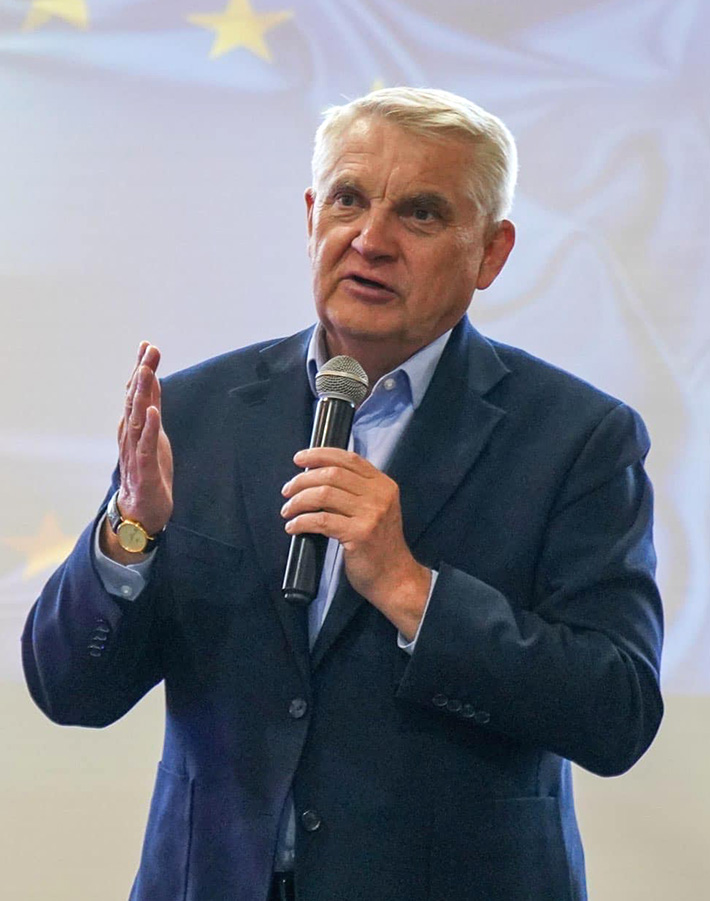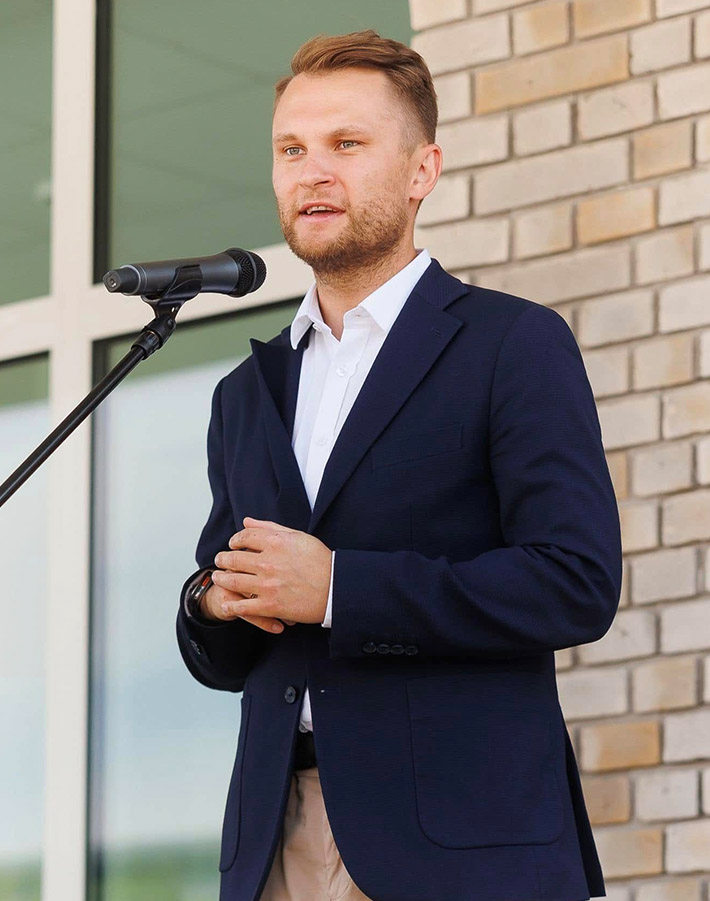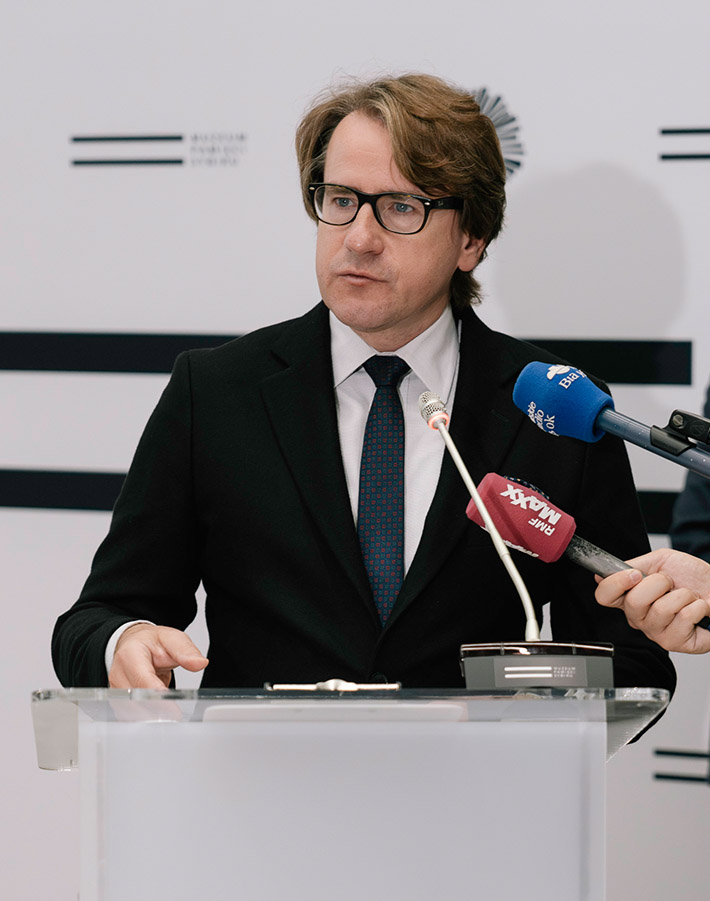WELCOME TO BIAŁYSTOK!
Dear Ladies and Gentlemen,
I would like to cordially welcome all of you who have come to our beautiful city of Białystok. I am extremely proud to host you in a place that combines a rich history, dynamic progress, and a remarkable atmosphere. Białystok is a city that is constantly developing, offering its residents a great number of opportunities and attractions.
One of our latest and most significant achievements is building the Sybir Memorial Museum. This unique place commemorates the fate of Poles deported over the centuries, first deep into Russia and later to the Soviet Union, being at the same time a proof of our commitment for preserving historical memory. The museum is not only a space for reflection but also a symbol of collective memory and respect for those who went through the most difficult moments in the history of our nation.

Białystok is a city open to diversity, full of energy and opportunities. We are proud of our history, but we are also focused on the future, looking for further development and creating a place where everyone can feel good.
The history of Białystok dates back to the 15th century. This city harmoniously combines tradition with modernity. In the 18th century, under the rule of Jan Klemens Branicki, it was called the “Versailles of Podlasie”, becoming the pearl of the region. The 19th century brought dynamic industrial development, making the city an important center for the textile industry. Before World War II, Białystok was a place where cultures and religions came together – Poles, Jews, Russians, Belarusians, and Tatars lived together, giving the city a unique character. Today, we proudly cultivate our multicultural past, developing dynamically as a modern and friendly place on the map of Europe.
Organizing the European Museum of the Year Award (EMYA) in May 2025 is a great honor and an exceptional opportunity to present the beauty and potential of our city to the world. I cordially invite you to discover the charms of Białystok and take advantage of its rich cultural and educational opportunities.
Mayor of the City of Białystok
Dear fellow museum community members,
Welcome to the 48th Annual Conference and Awards Ceremony. This 2025 edition brings us to Białystok where its cultural venues await us.
With its history as one of the leading centres of academic, cultural and artistic life in Poland, we look forward to exploring, learning and listening. A great thank you for the all the time, effort and excellent organisation to the city of Białystok, our Polish colleagues, and our host, the Sybir Memorial Museum, proud winner of the Council of Europe Museum Prize 2024.
As we gather as EMYA and museum community members—professionals, students and partners alike—the conference programme provides us with a new chance to engage with leading museums, bringing innovations and highlighting and celebrating the role museums fulfill.

Museums are many things, but not least platforms for empowerment, cultural participation and social justice. By promoting innovative approaches in the museum sector throughout the whole continent, we hope to inspire you in shaping the museum you are in or wish to create. This year’s theme “Remembrance and Solidarity for Collective Action” is an important compass, especially now that we are confronted with intolerance and political extremism that remind us of our troubled past. It is crucial to acknowledge this past and spring into action to ensure the rights of all our fellow citizens in Europe in its entirety.
The European Museum of the Year Award has been presented every year since 1977. The winners represent the best in innovation and excellence in new or redeveloped museums, independent of disciplines, scale, funding and obligations, and across the various cultural contexts of Europe. This year we have 42 nominees from 18 countries across Europe, representing the best of the European museum tradition of change and innovation. We also await the announcement of the important recognitions: the Kenneth Hudson Award for Institutional Courage and Professional Integrity, the Silletto Prize for Community Participation and Engagement, the Portimão Museum Prize for Welcoming, Inclusion and Belonging, and the Meyvaert Museum Prize for Environmental Sustainability.
The support of our partners is crucial. We thank our institutional and supporting partners for their commitment, support, advice and encouragement for the work we do and our shared vision for European museums.
On behalf of the Board of Trustees of the European Museum Forum—the legal and organisational framework for EMYA—I wish you a very fruitful conference and an excellent time in Białystok.
Chair a.i. Board of Trustees, European Museum Forum
Dear Guests,
Since the establishment of the Sybir Memorial Museum, it has been very important to me that – due to the significance of the topic it presents and the excellent form of its message – it should be recognized internationally. That is why I decided to submit its application for the prestigious Council of Europe EMYA Prize for the best museum institution on the European continent. I am very glad that these efforts have been noticed, and that our Museum received such an honorable distinction.
My personal participation in the award ceremony, which significantly emphasizes the importance of our work and memory of the difficult fate of the exiles, was a great honor for me. I would like to thank everyone who contributed to this success. I am extremely proud that Białystok, a city with such a unique and moving history, will host one of the most important museum events in Europe.

Member of the Polish Parliament, Vice-Chairman of the Polish Delegation to the Parliamentary Assembly of the Council of Europe, Chairman of the Council of the Sybir Memorial Museum
Dear Ladies and Gentlemen,
The Sybir Memorial Museum in Białystok is a unique place that combines the function of a museum facility, a research institute, and an authentic memorial site. Our aim is to explore, document, and popularize knowledge about the fate of the people from Central and Eastern Europe who were forcibly deported and sent to labor camps deep into the Soviet Union during the 20th century. We would like to ensure that the memory of these dramatic events remains alive in the consciousness of contemporary societies.
One of the Museum’s main goals is to share this knowledge internationally. We collaborate with many institutions worldwide organizing exhibitions and conferences together as well as publishing the results of our research.

Visiting the exhibition is a multisensory experience: visitors hear the voices of the Sybiraks and explore spaces that indicate their stories. The exhibition is a story of courage, suffering, hope, and the strength to survive.
We are proud that the Museum’s work has been recognized internationally. In 2024 the Council of Europe awarded us the prestigious Council of Europe Museum Prize. This distinction emphasizes the importance of our work and inspires us to continue our efforts for keeping the remembrance of history.
We believe that only by sharing knowledge about these tragic moments in history we can take part in developing more understandable and safer world. As soon as we forget history, it begins to remind us of itself.
Director of the Sybir Memorial Museum